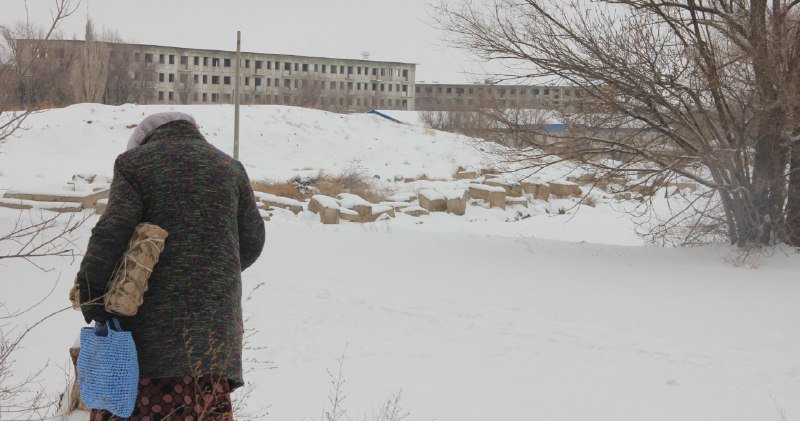
At the entrance to the market, you can see different goods: clothes for children and adults, shoes, toys, building materials and even fresh fish. There are few customers. One of the women selling children’s clothes comes up to us and asks why we’ve come to Zhanatas. We are, it seems, very different from the locals.
Aigul moved to Zhanatas from a nearby region. At the time, the municipal authorities were giving out houses free of charge, and she decided to take advantage of this opportunity. Now her only income is selling baby clothes. “The town is changing, but there is no trade,” says Aigul. “My husband is unemployed and I have been working in the market for eight years. If enough customers come, then I get 2,000 tenge a day; if not, then only 1,000. Of course, this is not enough.”
Aigul really wants to leave Zhanatas, but needs money to do so. She cannot sell her house at a profit – a one-room apartment on the main street costs 500,000 tenge (£850); a three-room apartment, renovated and furnished, costs three million tenge (£5,100). Standalone houses are even cheaper.
“It’s so harmful”
“My mother couldn’t even find a vest to buy for me when I was born – she had to make everything herself.” Lyubov Struzhevskaya was born in Zhanatas, and her mother was born in the nearby town of Karatau, where she worked in technical control at the phosphate processing facility. According to Struzhevskaya, her mother often told her how people began to leave the town en masse in the early 1990s, when the “hungry period” began.
“There was nothing at all in the shops,” she continues. “Money depreciated, people carried it round in suitcases. There was no light, no water, no gas. As the independence of Kazakhstan in 1991 came closer, it seems, things got better: shops were opened, the tenge replaced the rouble. Children whose parents worked in factories lived well. They even had Kinder eggs. But for us, life was hard.”
Struzhevskaya’s mother lost her job at the phosphate plant several years before she was due to retire (a regular occurence, apparently). The family was forced to take leftover food from the market, to avoid having to steal food. Later, her mother got a job as a caretaker, and Struzhevskaya herself, at the age of 12, started work in a sewing workshop. A sewing machine still saves her in difficult times.
“From 1996 to 1999, we had another hunger period. We didn’t have cats and dogs in Zhanatas – people ate them. It was the only meat one could afford. There was also an outbreak of tuberculosis, which lasted until 2007. If someone made pies from leftovers, neighbours stole them. You’d go out into the street, you come home, and the pies were gone.”
Struzhevskaya realised she would never be able to leave her home town. After college, she got a job at the Kazphosphate plant in the electrical laboratory, while still working as a seamstress and technician on the side. Her mother died early – she had diabetes and heart problems – and she now lives with her six-year-old son.